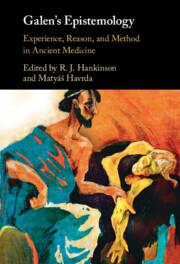40 results
Abbreviations
-
- Book:
- Galen's Epistemology
- Published online:
- 04 May 2022
- Print publication:
- 12 May 2022, pp vii-viii
-
- Chapter
- Export citation
Contents
-
- Book:
- Galen's Epistemology
- Published online:
- 04 May 2022
- Print publication:
- 12 May 2022, pp v-vi
-
- Chapter
- Export citation
Introduction
-
-
- Book:
- Galen's Epistemology
- Published online:
- 04 May 2022
- Print publication:
- 12 May 2022, pp 1-12
-
- Chapter
- Export citation
Index of Passages
-
- Book:
- Galen's Epistemology
- Published online:
- 04 May 2022
- Print publication:
- 12 May 2022, pp 310-320
-
- Chapter
- Export citation
General Subject Index
-
- Book:
- Galen's Epistemology
- Published online:
- 04 May 2022
- Print publication:
- 12 May 2022, pp 321-326
-
- Chapter
- Export citation
Bibliography
-
- Book:
- Galen's Epistemology
- Published online:
- 04 May 2022
- Print publication:
- 12 May 2022, pp 290-309
-
- Chapter
- Export citation
Copyright page
-
- Book:
- Galen's Epistemology
- Published online:
- 04 May 2022
- Print publication:
- 12 May 2022, pp iv-iv
-
- Chapter
- Export citation
Chapter 3 - Discovery, Method, and Justification
-
-
- Book:
- Galen's Epistemology
- Published online:
- 04 May 2022
- Print publication:
- 12 May 2022, pp 79-115
-
- Chapter
- Export citation

Galen's Epistemology
- Experience, Reason, and Method in Ancient Medicine
-
- Published online:
- 04 May 2022
- Print publication:
- 12 May 2022
Chapter 13 - God and the Material World
-
-
- Book:
- Cosmology and Biology in Ancient Philosophy
- Published online:
- 21 May 2021
- Print publication:
- 10 June 2021, pp 224-244
-
- Chapter
- Export citation
Chapter 12 - Teleology and Necessity in Greek Embryology
- from Part IV - Teleology in Medicine
-
-
- Book:
- Teleology in the Ancient World
- Published online:
- 04 October 2017
- Print publication:
- 12 October 2017, pp 217-241
-
- Chapter
- Export citation
Chapter 6 - Motion: M 10.37–168
-
-
- Book:
- Sextus Empiricus and Ancient Physics
- Published online:
- 05 July 2015
- Print publication:
- 22 July 2015, pp 217-274
-
- Chapter
- Export citation
Contributors
-
-
- Book:
- The Cambridge Dictionary of Philosophy
- Published online:
- 05 August 2015
- Print publication:
- 27 April 2015, pp ix-xxx
-
- Chapter
- Export citation
Fridolf Kudlien and Richard J. Durling (eds), Galen's method of healing, Proceedings of the 1982 Galen Symposium, Studies in Ancient Medicine series, Leiden, E. J. Brill, 1991, pp. viii, 205, DFl. 110.00 (90-04-09272-2).
-
- Journal:
- Medical History / Volume 36 / Issue 2 / April 1992
- Published online by Cambridge University Press:
- 16 August 2012, pp. 236-237
-
- Article
-
- You have access
- Export citation
Ethics and Action in Early StoicismBrad Inwood Oxford, Toronto: Oxford University Press, 1985. Pp. x, 348. $39.50
-
- Journal:
- Dialogue: Canadian Philosophical Review / Revue canadienne de philosophie / Volume 26 / Issue 2 / Summer 1987
- Published online by Cambridge University Press:
- 13 April 2010, pp. 407-411
-
- Article
- Export citation
Aristotle on Sleep and Dreams: A Text and TranslationDavid Gallop, editor Peterborough, ON: Broadview Press, 1990, xiii + 201 pp., introduction, notes and glossary.
-
- Journal:
- Dialogue: Canadian Philosophical Review / Revue canadienne de philosophie / Volume 33 / Issue 2 / Spring 1994
- Published online by Cambridge University Press:
- 13 April 2010, pp. 340-343
-
- Article
- Export citation
Perception and Evaluation: Aristotle on the Moral Imagination*
-
- Journal:
- Dialogue: Canadian Philosophical Review / Revue canadienne de philosophie / Volume 29 / Issue 1 / Winter 1990
- Published online by Cambridge University Press:
- 13 April 2010, pp. 41-64
-
- Article
- Export citation
Aristotle on Imagination and Action: Introduction
-
- Journal:
- Dialogue: Canadian Philosophical Review / Revue canadienne de philosophie / Volume 29 / Issue 1 / Winter 1990
- Published online by Cambridge University Press:
- 13 April 2010, pp. 3-4
-
- Article
- Export citation
5 - Aenesidemus and the rebirth of Pyrrhonism
- from Part I - Origins and Development
-
-
- Book:
- The Cambridge Companion to Ancient Scepticism
- Published online:
- 28 March 2010
- Print publication:
- 28 January 2010, pp 105-119
-
- Chapter
- Export citation
10 - Galen on the limitations of knowledge
-
-
- Book:
- Galen and the World of Knowledge
- Published online:
- 06 August 2010
- Print publication:
- 10 December 2009, pp 206-242
-
- Chapter
- Export citation



